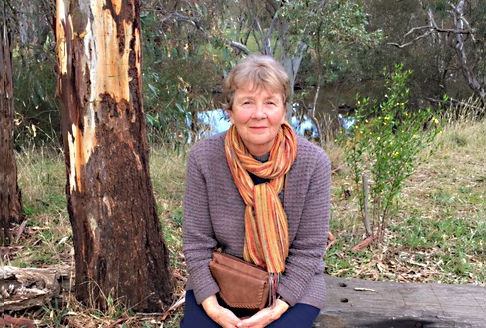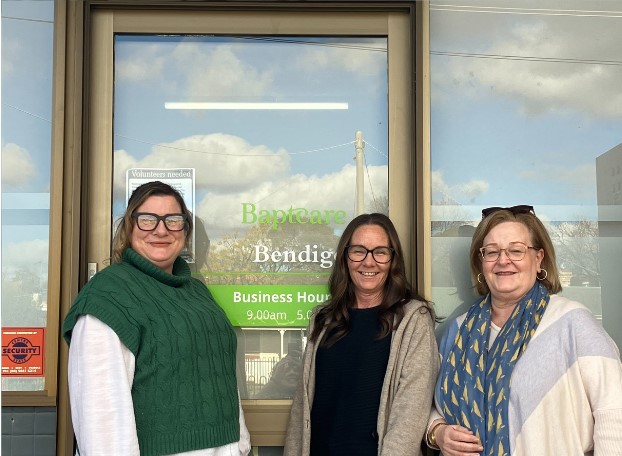Passionate volunteers help give families a better start
- 13 Jun 2023

There are some moments you don’t forget.
Such as the little non-verbal boy, initially wary, who allowed Glenda Dawson to play with his toy trains – then had such fun that he spread his arms wide at the end of the session to try to block her from leaving.
Or the mother battling mental health issues, raising four children with their own health challenges, isolated from her family, who turned to Glenda one day and said, ‘I trust you.’
“It was a very special moment, knowing that she felt that way, and that I could provide that connection for her,” Glenda, a long-serving volunteer with Baptcare Home-Start in Bendigo, reflects.
Home-Start is a voluntary home visiting service that offers practical support and mentoring to families with children under the age of five. It is an evidence-based program based on the simple but powerful belief that children need a happy and secure childhood and that parents play the key role in giving their children a good start in life and helping them achieve their full potential.
Trained volunteers are linked to families on a one-to-one basis, to give support and foster community connection on a short- or long-term basis. Most volunteers are parents or grandparents themselves.
Glenda is a retired schoolteacher and grandmother who felt she had the capacity to contribute to her community. “I prayed about what I should do with my free time. It was then I saw the ad to volunteer with Baptcare Home-Start. It’s the best thing that’s ever happened to me.
“The training, supervision and support that I was given at the start and continue to be given on an ongoing basis is vital to the work that we do,” she says. “As I look at our community and the times we’re living in, the need for this program is growing.
“Sometimes it is just a matter of sitting over a cup of tea and having a chat. Sometimes I fold the washing, sometimes I go with them to a medical appointment, and sometimes I keep an eye on the kids while the Mum has a shower for longer than the two minutes she usually gets to herself.
Overall, it’s just about building the relationships and encouraging them. It is amazing, and I have seen that Baptcare Home-Start makes a real difference to these families.”
Glenda’s observations are echoed by Jenny Mitchell, another highly-valued Baptcare Home-Start volunteer. Jenny is an experienced social worker who was looking for an opportunity to continue to use her skills during retirement.
“I am such an advocate for this program,” she enthuses. “For a start, it’s not time limited. It’s not six weeks and then it’s done – it’s a relationship with a family for as long as they need.
“It’s a strength-based program, which I love. We’re not there to tell parents what to do or to judge them. It’s about walking alongside them. It’s about looking for the strengths, so when I’m with a family I always make sure I comment on things I can see that are going well. And there is always something you can say!
“I think every city and town in Australia should have multiple Home-Start programs, but also I love that our programme is small. I think that’s what makes it effective; it’s not giant and one-size-fits-all – it’s small and local and manageable.”
Baptcare responds to each family’s needs through a combination of home-visiting support, group work, parenting education and social events. The aim is to support parents as they grow in confidence, strengthen their relationships with their children and widen their links with the local community.
Jenny also gives her time and abilities to help support the Baptcare team in training new volunteers. “I can’t emphasise enough how important this program is, and how incredibly cost-effective it is, and the value it provides to the community,” Jenny says.
“We hear over and over again from families how much they appreciate it and how it helps them to get on with their lives. In terms of dollars spent, the value to our community not just now but over time is enormous.
“We also have excellent ongoing training and support for the volunteers. You have to support your workers, be they volunteers or paid, and that’s what happens with Baptcare’s Home-Start.”
Baptcare Home-Start operates in Bendigo, where the current program has been active for 12 years and works with around 40 families and 100 children each year, and also our newer service in Sunshine. The program has a proven, lasting and positive impact on the development of children and the health and welfare of families.
More information: Home-Start Program – Baptcare
Community news
-

Team Spotlight: Home Start, Mother Goose and Supported Playgroup Team in Bendigo
Baptcare runs the Home-Start, Supported Playgroup, and Parent-Child Mother Goose Programs in Bendigo. Jane, Home-Start Team Leader; Angie, Group Facilitator, Mother Goose Program and Supported Playgroup; and Jess, Group Facilitator, Mother Goose Program and Supported Playgroup, are our wonderful team members, dedicated to helping families and connecting them with strong support within the local Bendigo and Macedon Ranges communities. Keep reading to learn more about these exceptional employees, their work, and why they love what they do.
- 30 Jan 2026
-

Staff Spotlight | Lois Yamuta – Project Lead, Living Well Together
What inspired you to work in aged care and how did you come to lead the ‘Living Well Together’ program? My career in aged care started in New Zealand. I was studying Healthcare Management, where I was also introduced to aged care nursing, and the rest is history!
- 28 Jan 2026
-

Staff Spotlight | Belinda Evans – Baptcare Scholarship Winner
At Baptcare, we believe that investing in our people is the key to our shared success. That’s why we’re proud to offer the Baptcare Scholarship Program, providing up to $2,500 to support permanent employees, both full-time and part-time, in pursuing further education and professional growth.
- 27 Jan 2026
